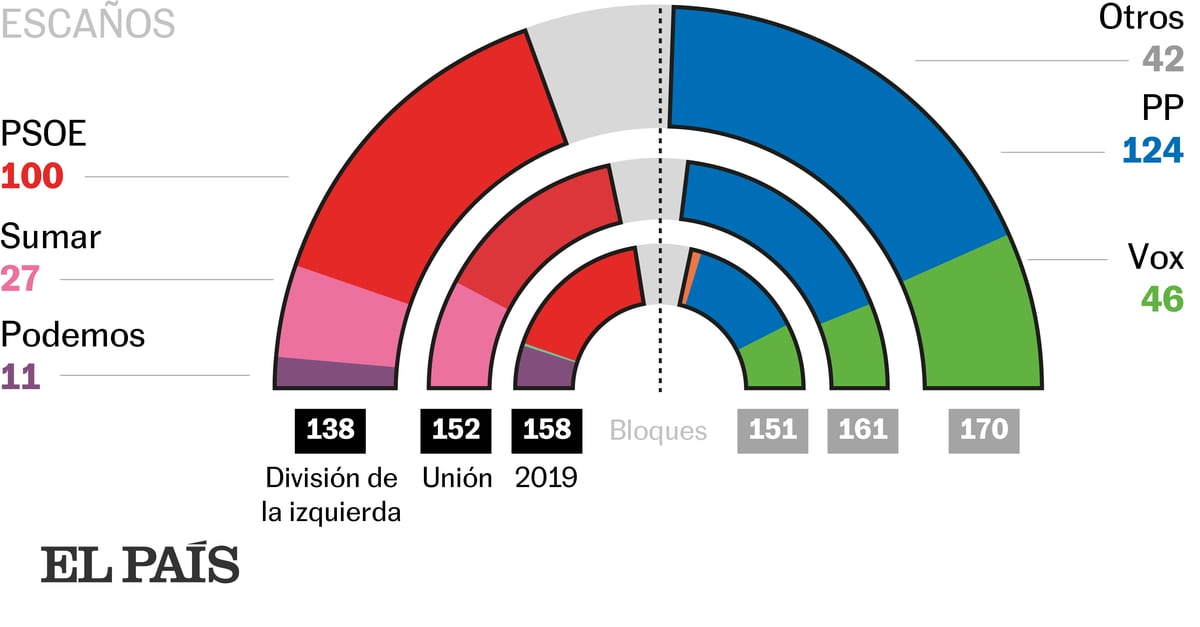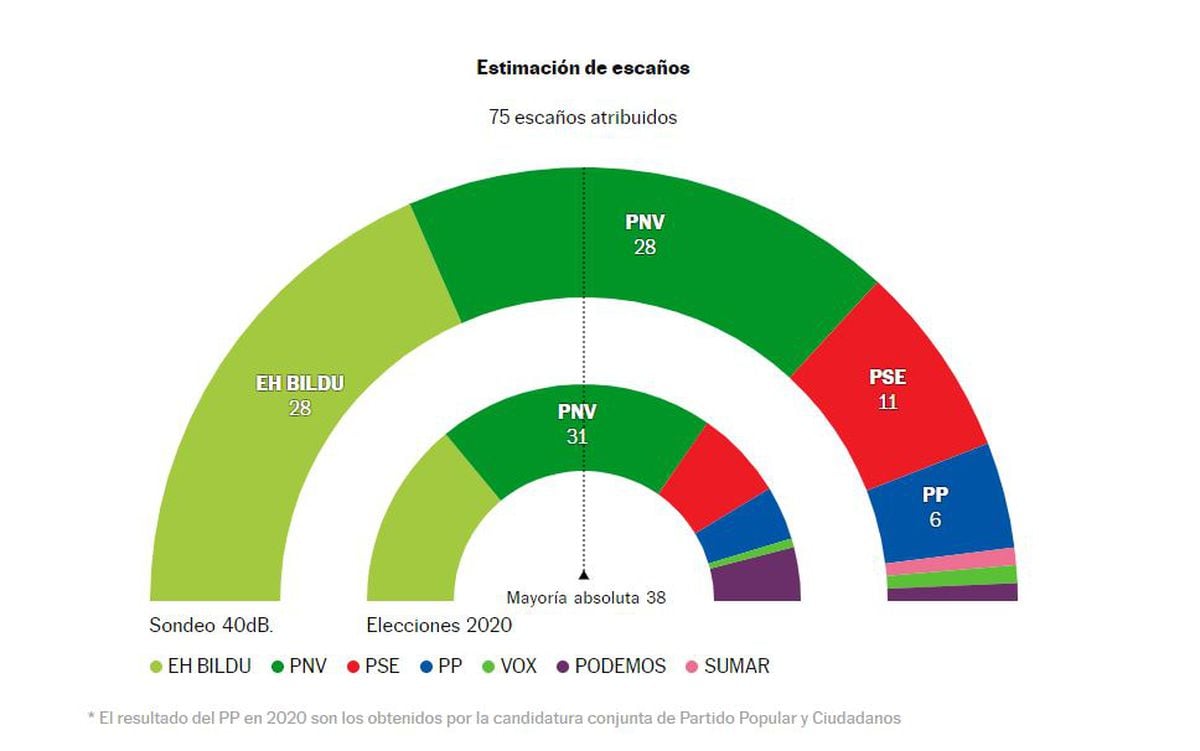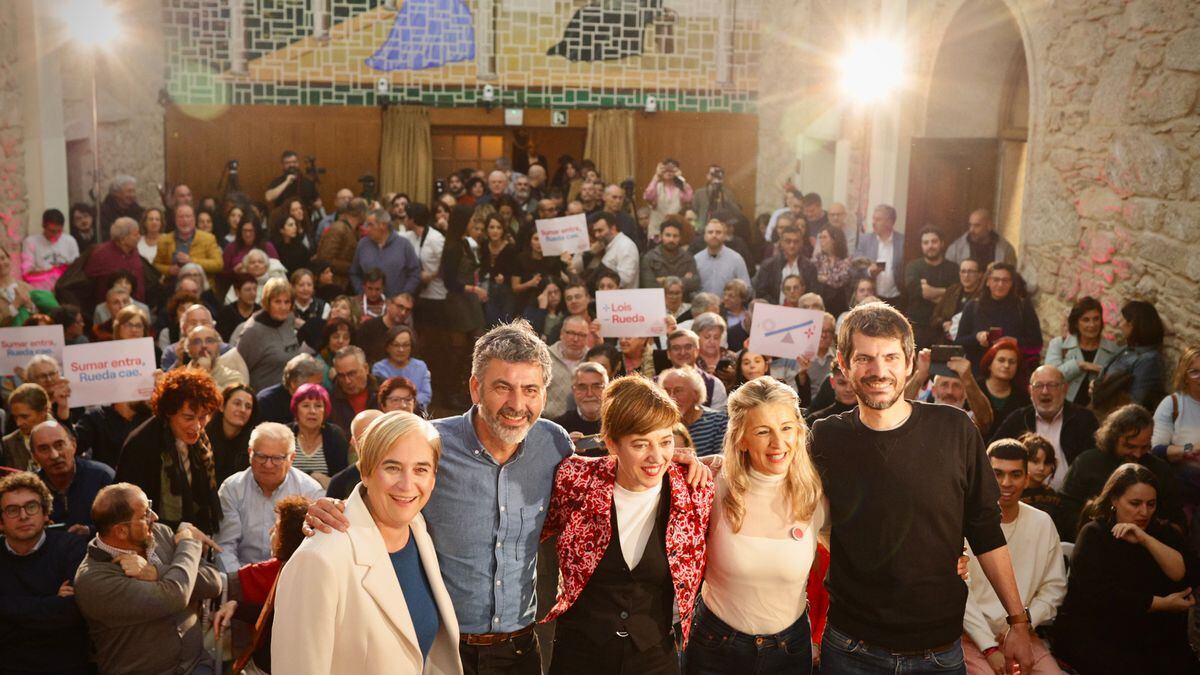The barometer may be 40dB.
for EL PAÍS and la SER shows how the political board has moved with the irruption of Sumar, the platform that Yolanda Díaz, second vice president of the Government, officially presented on April 2 to run in the year-end general elections.
The study ―2,000 interviews conducted between the 21st and 25th of last month― reveals that, for now, the new correlation of forces benefits the right, and that the disunity between Podemos and Sumar could cost the bloc a considerable loss of seats. left.
You can consult all the internal data of the survey on the web pages of EL PAÍS and SER.
In the previous barometer, which still did not include the presence of Sumar, the PSOE was close to drawing with the PP.
In this, however, the popular ones once again widen their advantage, by raising four tenths of a percentage point in their vote estimate (up to 28.4% of the votes), which would mean 124 seats (two more than in April), while the socialists (25.1%) leave nine deputies in a month (they would remain at 100).
The distance between the two parties would thus amount to 24 deputies.
Vox, currently the third political force in Congress, improves (up to 14.5%) and achieves two more seats (up to 46), recovering from the fall that was perceived in the previous barometer.
Sumar opens with expectations of 10.9% of the votes and 27 seats in Congress;
and Podemos, which lost almost five points after the presentation of Díaz's platform, would remain at 6.9% of the vote and 11 deputies.
After the slight improvement in the previous barometer, Ciudadanos obtains the worst data of the entire legislature (2% of valid votes), which further complicates its parliamentary presence.
In summary, compared to the results of 2019, the PP would win 35 seats;
the PSOE would lose 20;
Vox would leave seven and Podemos, which in the last generals presented itself in a coalition with IU, would obtain 24 fewer seats in Congress.
The space to the left of the PSOE is widening: Sumar and Unidas Podemos would obtain 17.8% compared to 15% that UP and Más País added in April, but this new correlation of forces increases the chances that the right will add an absolute majority ( 176) in the general elections: PP and Vox would gather 170 seats (six more than in April), while the PSOE, Sumar and Podemos would remain at 138. Most of the voters of the new electoral brand headed by Yolanda Díaz come from, in this order, of voters who in 2019 supported UP (43.4%), PSOE (26.3%) and Más País (9.7%).
The platform also removes 5.4% of voters from abstention.
Asked which form of government they would prefer, 31.8% affirm that a coalition between the PSOE and other brands of the left, that is, 13.1 percentage points more than those who opt (18.7%) for a coalition between the PP and Vox and also far from the 17.6% who would like the popular, at the head of the polls, to govern alone, or the 14.3% who would prefer an exclusively socialist Executive.
According to the 40dB analysis, if Podemos and Sumar were to run together in the elections, something on which they have not agreed so far, they would obtain 18.2% of the valid votes and 55 seats, that is, 17 more than those who would have going separately.
They would also displace Vox as the third political force and the left bloc would add a total of 152 deputies, 14 more than if Podemos and the Díaz platform were separately today.
The one on the right would lose 9 seats.
apportionment of blame
Among the voters of Unidas Podemos, those who want a unitary candidacy of Podemos and Sumar win by a large majority (83.3%), while among those who have decided to vote for Díaz that percentage drops to 64.9%.
If the focus of this question is opened to voters of all persuasions, Spaniards as a whole opt to a greater extent (41.8%) for both formations to compete separately, compared to 30.1% who opt for the Union.
Regarding the distribution of responsibilities in the event that there is finally no agreement, 21.5% point to Pablo Iglesias, co-founder and former leader of Podemos;
15.9%, to Yolanda Díaz;
and 12.7%, to Irene Montero, Minister of Equality and
number two
of Podemos.
These percentages change radically depending on the intention to vote: Podemos supporters blame the Vice President of the Government to a greater extent (33.6%), followed by Íñigo Errejón (14.4%) and Iglesias (12.4%).
Sumar's supporters blame the majority (40.8%) of Iglesias, who has no organic positions in UP but maintains a strong influence on the formation.
Among the voters of the PSOE and those of the nationalist and regionalist parties, the former secretary general of Podemos is also fundamentally pointed out.
leader assessment
21.5% of those surveyed believe that the best president of the Government would be the current one: the leader of the PSOE, Pedro Sánchez, who improves his previous assessment by 2.5 points;
followed by the president of the PP, Alberto Núñez Feijóo (19.5%);
Yolanda Diaz (15.5%);
Santiago Abascal, from Vox (12.3%);
Inés Arrimadas (4%), who has abandoned the presidency of Ciudadanos, and Ione Belarra, of Unidas Podemos (2.5%).
By memory of the vote, the leader of Sumar is the preferred option among those who voted for United We Can in 2019: 53.7% of these voters believe that she would be the best person to occupy the presidency of the Government, compared to 13.5 % who name Belarra, their candidate, and 13% (only half a point less) of those who prefer Pedro Sánchez;
Díaz is also the first choice among nationalist and regionalist voters (27.0%) and for 18% of the socialist electorate.
And, by intention to vote, the second vice president prevails over Belarra as the best option to preside over the country among the voters of Podemos, although with a smaller difference (35.1% compared to 28.1%).
Conversely, none of Sumar's voters consider the general secretary of Podemos as the best candidate for the presidency of Spain.





/cloudfront-eu-central-1.images.arcpublishing.com/prisa/LM5S5QYHYJDZ2DY5PMOYM3DWMU.jpg)
/cloudfront-eu-central-1.images.arcpublishing.com/prisa/GANAHD5ZAX4ZL7KEBUEKZVV4DU.jpg)


